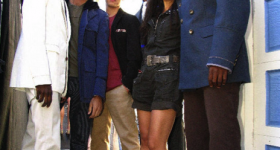The film shares the unimaginably tragic and incredibly inspiring stories of 4 women who still live to speak about the atrocities they endured during WW II. The film was uplifting in so many ways, as the focus was not on the tragedy of the past, but of the journey that each of these women faced after coming to the House of Sharing, a special center in Korea where survivors can share their stories, educate the public, and create awareness for crimes committed over 70 years ago. The film follows 4 survivors, all over 80 years old, on their monthly journies to the Japanese Embassy in Seoul, Korea where they continue to ask the Japanese Government to formally recognize the extent of sexual slavery during WW II and to make reparations for the atrocities committed. So far, the Japanese government has done niether, despite pleas from both the Korean and Japanese people.
The film was screened at the CalArts Bijou Theater tonite, and was followed by a special Q & A with 81 year old survivor, Koon-ja Kim. She is touring California (check out the website fo SF and LA dates) speaking about her experiences and sharing excerpts of the documentary film. The room was packed, and the film was beautifully edited and portrayed each of the women as strong, resilient heroes who have endured unspeakable abuse and have become active in trying to change the policy of the Japanese government. One of the most amazing aspects that the film explores is the use of painting and art that survivors have created to express their pain and suffering. The artwork, watercolors and sketches were presented between interviews with the women and footage of their protests in Seoul.
The artwork was intense and visceral, speaking silently and visually about how deep the pain from these crimes are for these women. The details of their stories of being abducted as children by the Japanese army, being captured, being tortured, and having to provide sex for 30 men or more a day in abhorrent conditions, seeking ways to kill themselves but being unable to, and finally coming home to Korea only to be ostracized by society and their families left me and the entire audience in tears.

A watercolor painted by one of the survivors
For me, the whole experience was numbing, terrifying and at the same time humbling...the fact that these women, even seventy years after the crime, are seeking recognition by governments speaks volumes about the failure of modern "nation building" and the absolutely unjustifable consequences of war. They have appealed to the UN, the US and Japan to seek a formal apology from the Japanese government, but to no avail. There is new hope now the that the new Secretary General of the UN is of Korean descent...but during the QA Koon-ja Kim reiterated that the situation is really about people seeking to speak out against the failures of their governments to resolve history. I kept thinking of Abu Grahib, our own atrocities and unwillingness as an American government to heal humans and people destroyed by our violent actions. I thought too of our governments unwillingness to truly heal the people and forests destroyed by Agent Orange during the Vietnam war. The list goes on...how we justify violence, and how ultimately, people are not represented by their goverments. One of the things that struck me most about the House of Sharing in Korea, is that they have about 6000 visitors annually to the center each year...and the vast majority of those visitors are Japanese. A number of the administrators at the House of Sharing are Japanese...they all speak against the actions of their government. And the same could be said for Americans who speak against the violence and atrocities committed by our own government.
While the actions of the Japanese military and the government cannot be justified, it turns out that the US is partly to blame for the difficulty the comfort women have had in getting the Japanese government to admit fault. During the QA I learned that immediately post nuclear detonations in Nagasaki and Hiroshima, as America embarked on "nation re-building" in Japan, great efforts were made to silence the pleas of the comfort women. Their cries were seen as potentially helping to arouse communist sympathies and the woes of the poor. In order to strengthen the new Japanese capitalist government, the US had to dilute any potential voices that could undermine the solidarity of the new nation. Many documents proving the extent of the Japanese Military's actions were destroyed in the process of building the new Japanese nation, forever hampering the efforts of these women seeking formal recognition from a government that now claims that adequate proof does not exist to warrant an apology.
As we watch the war in Iraq escalate and deepen, and more news about the ensuing chaos there comes to light, I wonder, how many of the atrocities committed and justified in the name of the American war for nation building will be declassified and used to discuss whether war can ever truly be justified?
If you are in LA or SF in the coming weeks, do check out the screening of this fantastic and incredibly relevant film! Details are on the House of Sharing website.
Robin Sukhadia
Mr. Hyphen 2006/2007









Comments